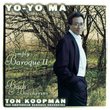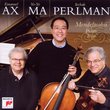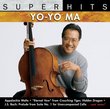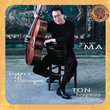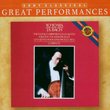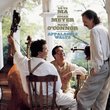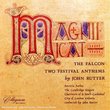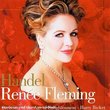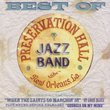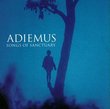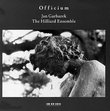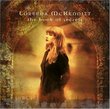| All Artists: Antonio Vivaldi, Ton Koopman, Amsterdam Baroque Orchestra Title: Vivaldi's Cello Members Wishing: 1 Total Copies: 0 Label: Sony Genre: Classical Styles: Opera & Classical Vocal, Chamber Music, Forms & Genres, Concertos, Historical Periods, Baroque (c.1600-1750), Classical (c.1770-1830), Instruments, Strings Number of Discs: 1 SwapaCD Credits: 1 UPC: 827969091623 |
Search - Antonio Vivaldi, Ton Koopman, Amsterdam Baroque Orchestra :: Vivaldi's Cello
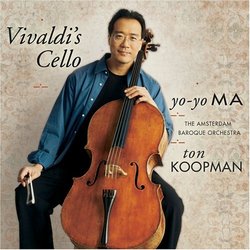 | Antonio Vivaldi, Ton Koopman, Amsterdam Baroque Orchestra Vivaldi's Cello Genre: Classical
The great Yo-Yo Ma has recently (in addition to his world music explorations) moved to the baroque cello, a so-called period instrument, and his transition has been remarkably smooth. He is indeed a musical polyglot, and t... more » |
Larger Image |
CD Details
Synopsis
Amazon.com
The great Yo-Yo Ma has recently (in addition to his world music explorations) moved to the baroque cello, a so-called period instrument, and his transition has been remarkably smooth. He is indeed a musical polyglot, and this CD finds him solidly in the heart of the Baroque period, with music by Vivaldi. In addition to three concerti the composer wrote for cello, there are some fascinating transcriptions. The Largo violin solo from the "Winter" concerto of the Four Seasons is here beautifully played on cello, its darker tone added substituting gravity for chill in the wintry landscape. A concerto originally for viola d'amore, lute and strings has been transformed into one for cello, organ, strings and continuo, with Baroque expert Ton Koopman as transposer and organist (and sympathetic, energetic conductor throughout). And oddest of all, Koopman has created cello solos out of arias (one of which is helped by a perky bassoon) originally composed for female voice from a couple of operas, the oratorio Juditha Triumphans, and the familiar "Laudamus te" from the famous "Gloria." Leave it to these musicians to re-invent Vivaldi with respect and a clear ear for musical values--not to mention sheer entertainment and a forward propulsion which makes it all so invigorating. --Robert Levine
Similar CDs
| Yo-Yo Ma Super Hits Genre: Classical Label: SonyBMG Special Markets | |
Similarly Requested CDs
| Beatles 1962-1966 (The Red Album) Genres: Rock, Classic Rock Label: Capitol | |
| Preservation Hall Jazz Band Best of Genre: Jazz Label: Sony | |

 Track Listings (19) - Disc #1
Track Listings (19) - Disc #1